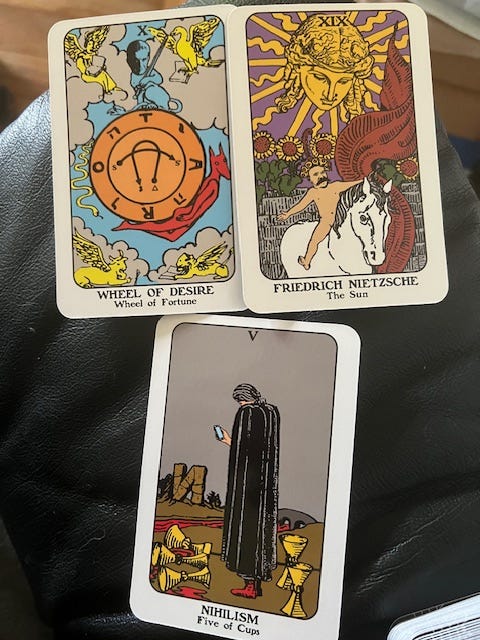I just got a great present! It’s a tarot deck that is almost the traditional Rider-Waite deck, but with every card tweaked to depict a philosopher or philosophical concept. Some traditions say your first tarot deck should be a gift, while others call that a sneaky kind of gatekeeping. So no judgement if you want to buy it for yourself.
I want to learn the Rider-Waite imagery better because I have the distinct feeling people are subtly working it into things all the time and I’m always missing it. I also want to try out injecting randomness into my writing process. Adding in a little noise can be a helpful thing to try in almost every domain. So this is a great present because I can use it to generate random writing prompts that are approximately on brand for Outlandish Claims.
The first methodology I’m going to try, based on nothing in particular, is to separate the deck into major arcana plus court cards (these are mostly specific people) and minor arcana (these are all concepts, I think). Then I’m going to draw two from the first pile and one from the second, and try to write an essay about all three. Oh, and I’ve removed the Strength card from the deck, because my mom’s writing a book about her and I don’t want spoilers. So let’s see what we get…
Huh. Got one of the few non-person major arcana. Not only that, but it’s a nonstandard term, unlike almost every card. The little explanatory booklet says that the Wheel of Desire represents their materialist shift from the concept of luck to a term they call “desire,” defined in an expansive way that sounds like it could reasonably translate to “game theory.” In this context, it feels like a comment on this project itself—I’m using Tarot as a prompt to give the appearance of randomness, but really I’m just writing stuff I want to write.
The other two cards are Nietzsche and nihilism. The two are very associated with each other. Nietzsche called himself a nihilist, and if you ask someone to name a nihilist philosopher, odds are good they’d name Nietzsche. But, interestingly, they’ve matched these two to tarot cards with opposite connotations. Nietzsche is The Sun, which if you’re using tarot for actual fortune-telling is considered the most unambiguously good card to see. Many tarot cards invert their meanings if drawn upside-down, but an inverted Sun is still a Sun. It’s the positivity card.
Meanwhile, Nihilism is the Five of Cups, which represents negativity. The character in Rider-Waite is focused on three spilled cups, ignoring the two that are still standing. The illustration here is similar, but the character is looking at a phone, not the fallen cups. Kids these days.
So what gives, here? Why is Nietzsche the Nihilist positivity, and Nihilism negativity?
I like this. It feels like an easter egg. The thing is, Nietzsche never saw nihilism as an end state. Step one is to unpack and discard our conventional notions of morality and identity. Step two is to create new ones, ones that better enable freedom, art, and joy. Nietzsche called himself a nihilist because he was mostly working on step one. But he wasn’t trying to lead us into the void. He was trying to lead us through it. It’s like the solar hero’s journey in mythic archetype—the sun has to set before it can rise.
He gets a bad rap. This is partly his own fault, for his trolling book titles like “Beyond Good and Evil,” which understandably led many to believe he was rejecting morality altogether. Not the case. His writing explicitly condemned the rise of anti-Semitism and German nationalism, and he refused to associate with anti-Semites, a principled stand which came at significant personal cost. Then, when he died, his proto-Nazi sister co-opted his writing in the service of his enemies. Which is the part of his bad reputation that’s not his fault—the Nazis stole him.
I’m glad we’re reclaiming Nietzsche and his Joyful Science. Here’s a relevant scrap of his poetry, translated by Thomas Common.
Hence, music! First let darker shadows come,
And grow, and merge into brown, mellow night!
'Tis early for your pealing, ere the dome
Sparkle in roseate glory, gold-bedight
While yet 'tis day, there's time
For strolling, lonely muttering, forging rhyme—
My bliss! My bliss!






Wait, is that Apollo as The Sun?
I love this very much. According to "Seventy-Eight Degrees of Wisdom", the 5 of Cups is a "reaction to loss." I've always understood Nihilism this way historically, whether an individual or collective reaction. The same book also points out that the figure "does not yet realize something remains." Beyond kids these days, I feel like the figure looking at their phone could be either doomscrolling (useless, bad information) or (optimistically) in the process of finding something helpful... perhaps navigating across the bridge on the other side of that red river, which could enable them to move on?
Wait. E.G. is in this deck as a Strength card?